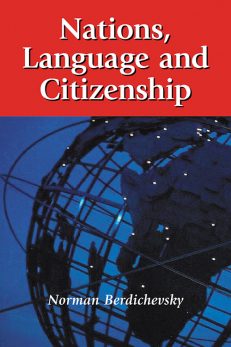Nations, Language and Citizenship
$39.95
In stock
About the Book
This study evaluates the importance of language in achieving a sense of national solidarity, considering factors such as territory, religion, race, historical continuity, and memory. It investigates the historical experiences of countries and ethnic or regional minorities according to how their political leadership, intellectual elite, or independence movements answered the question, “Who are we?” The Americans, British, and Australians all speak English, just as the French, Haitians, and French-Canadians all speak French, sharing common historical origin, vocabulary and usage—but each nationality’s use of its language differs. So does language transform a citizenry into a community / or is a “national language” the product of idealogy?
This work presents 26 case studies and raises three questions: whether the people of independent countries consider language the most important factor in creating their sense of nationality; whether the people living in multi-ethnic states or as regional minorities are most loyal to the community with which they share a language or the community with which they share citizenship; and whether people in countries with civil strife find a common language enough to create a sense of political solidarity. The study also covers hybrid languages, language revivals, the difference between dialects and languages, government efforts to promote or avoid bilingualism, the manipulation of spelling and alphabet reform. Illustrations include postage stamps, banknotes, flags, and posters illustrating language controversies.
Instructors considering this book for use in a course may request an examination copy here.
About the Author(s)
Bibliographic Details
Norman Berdichevsky
Format: softcover (6 x 9)
Pages: 288
Bibliographic Info: photos, notes, bibliography, index
Copyright Date: 2004
pISBN: 978-0-7864-1710-0
eISBN: 978-0-7864-2700-0
Imprint: McFarland
Table of Contents
Acknowledgment iv
Preface and Dedication 1
Introduction 3
PART I: Countries with Competing Candidates for the National Language
1. Hebrew versus Yiddish: The Case of Israel 13
2. The Attempt to Revive Irish: A Nation Once Again 44
3. Norway’s Schizophrenia: New Norse (Nynorsk) versus Dano-Norwegian (Bokmaal/Riksmaal) 55
4. Maltese: “The Curse of the Country and Fit Only for the Kitchen” 66
PART II: Multiethnic Countries with Bilingualism and Multilingualism
5. Belgium: The Classic “Buffer State” 77
6. Switzerland 92
7. Spain: Five Official Languages, or Is It Only Four and Two-Thirds? 103
8. Canada 116
9. India 124
10. South Africa 129
PART III: The Celtic “Pygmy” Revivals of Welsh and Scots
11. Wales, Welsh and Plaid Cymru 139
12. Scotland, Scots and the Threatened Demise of Scottish Gaelic 146
PART IV: Dialects or Languages?
13. Italian Dialects 157
14. Scandinavian Languages: Unification Tried and Rejected 160
PART V: The Quarreling Cousins
15. Serbian and Croatian (Serbo-Croatian) 165
16. Czech and Slovak 171
17. Romanian and Moldavian 174
PART VI: Ethnic or Regional Minorities: Bilingual or Using the “Wrong Language”?
18. The Romanian-Speaking Hungarians 181
19. Alsace-Lorraine: German Speakers Who Identify with France 187
20. The German-Speaking Danish Minority in South Schleswig 191
21. The Swedish-Speaking Finlanders 199
22. Israel’s Hebrew-Speaking Arab Citizens 205
PART VII: Spanish versus Portuguese in Uruguay: The Case of Determined Government Planning to Avoid Bilingualism
23. Uruguay: The Origins of the Buffer State 215
PART VIII: The Struggle with the Chains of the Past (Greek, Arabic and Turkish)
24. The Greek Dilemma: Ancient (Attic) versus Demotike versus Katharevousa 225
25. Arabic: The Koran versus Modern Standard versus the Local Vernaculars 232
26. Turkish Identity Frees Itself from the Islamic/Arabic Yoke 241
Conclusion 245
Chapter Notes 259
Bibliography 267
Index 275
Book Reviews & Awards
- “Essential…highly recommended”—Choice
- “Broad…useful”—Ethnic & Racial Studies.





